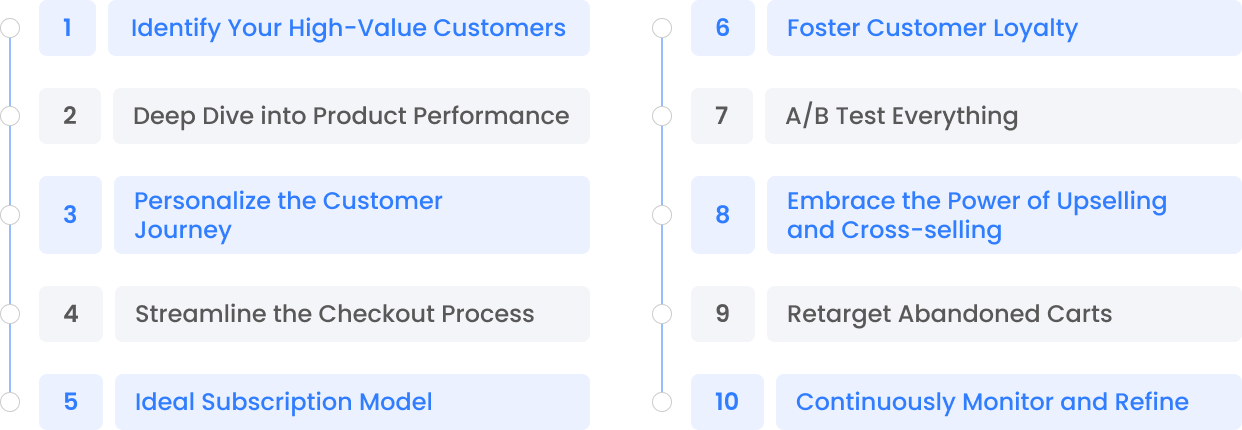Ecommerce Analytics Playbook
How to 3x Your MRR?
Stop leaving money on the table! This Ecommerce Analytics Playbook gives you powerful tactics to 3X your Monthly returns, gain better market insights, and understand buyers’ behavior like never before. Streamline your online store operations from A to Z with advanced analytics.

What Is Ecommerce Analytics? Definition, Benefits, and Examples
Ever wondered why some online stores seem to magically convert visitors into loyal customers in a shorter period, while others struggle to get a single click? Well, the reasons can be different but one’s that consistent is data! And not only collecting data but analyzing them for good, and that is what in layman’s terms is called Ecommerce analytics.
To simplify, ecommerce analytics is a step-by-step process of collecting, analyzing, and interpreting data about your online retail store(irrespective of the industry it’s serving or no. of buyers coming). This data can come from many known and unknown sources, like website traffic, customer behavior, market trends, competitors’ activities, and sales figures. By utilizing this vast pipeline of information, you can gain valuable insights to optimize your store and multiply your sales figures.
But how much are we really talking about? Here’s a stat in the McKinsey & Company report to check things already happening around in ecommerce: Businesses that leverage data analytics see a 5% to 9% increase in sales per year. That’s a significant chunk of change or innovation in the online retail sector that you could be missing out on!
Benefits of Ecommerce Analytics For Online Stores
You know, Ecommere analytics seems a tricky business at first, but it isn’t and it comes with a lot of advantages. By defining your short and long-term goals, such as increasing customer acquisition, boosting average order value, or improving customer retention, you can go with e-commerce analytics to gain these benefits:
Identify hidden gems
The trick behind this is to get into your ecommerce data to uncover which products have gotten you good numbers in the past and which ones are gathering dust. This allows you to rework your marketing strategies and inventory management for increased profit.
Understand your buyers
Ever feel like you're firing marketing campaigns into the null? Ecommerce analytics helps you create a customer profile, or you might say- an ideal customer profile. By analyzing their behavior continuously over your site, you can understand their preferences and tailor your offerings(product range and services) accordingly. This will lead you to show targeted ads or product recommendations that resonate with your buyer’s specific needs!
Optimize your website
Is your checkout process a maze? Ecommerce analytics metrics like conversion rates and bounce rates tell you exactly where your website is excelling – and where it's failing. You can then use this data to streamline the customer/user journey and eliminate any roadblocks preventing smooth purchases.
Real-World Examples Of Ecommerce Analytics Solutions (Case Studies)
E-commerce thrives on data! But how do real businesses use them to fetch ideal buyers, curate preferred product ranges, and mint better returns? Let’s check some of the Ecommerce data analytics solutions in action!
What is MRR in ecommerce?
MRR, or Monthly Recurring Revenue, is a key metric for any ecommerce business with subscription plans or recurring revenue streams. It reflects the regular or generated income you can expect each month from customer subscriptions. It’s a straightaway metric to analyze your ecommerce store’s financial health in terms of ongoing sales, rather than just focusing on single-occuring purchases.
Why Analyzing MRR Is Important In Ecommerce?
The next time you’re analyzing your ecommerce performance, remember to pay close attention to your MRR. It’s a valuable metric that provides insights into your business’s overall health and sustainability potential. Tracking MRR data is becomes important because it helps your business with:
Predictability
MRR helps you forecast future revenue with greater accuracy. This allows for better financial planning, budgeting, and resource allocation.
Growth Tracking
By monitoring MRR over time, you can track your business's growth. A rising MRR indicates successful customer acquisition and retention strategies
Customer Value Measurement
MRR helps assess the lifetime value of your customers. By understanding the average monthly revenue generated per customer, you can make prompt decisions about customer acquisition costs and marketing strategies.
Focus on Retention
Since MRR focuses on recurring revenue, it naturally incentivizes strategies that keep customers coming back. This can lead to improved customer service, loyalty programs, and product development efforts focused on long-term customer satisfaction.
How has data analytics evolved specifically in the ecommerce industry?
The e-commerce market is becoming competitive day by day! A stat from the Baymard Institute poll reveals that a staggering 70.019% of businesses report abandoned shopping carts. Imagine the frustration – potential customers filling their carts, only to disappear before checkout.
So, how can businesses navigate this environment and ping ideal buyers only to boost MRR in the end? Data analytics has helped here a lot! By using the collected stacks of customer data available, businesses can answer critical questions:
- Who are my ideal customers, and how can I reach them more effectively?
- What products are underperforming, and why?
- Where are there opportunities to streamline the checkout process and boost conversion rates?
As per Grand View research report, the global e-commerce analytics market size is expected to expand at a compound annual growth rate (CAGR) of 14.2%, reaching USD 10.24 Billion by 2027.
This stat highlights the increasing adoption of data analytics in the ecommerce industry(small, mid-sized, or MNCs). Initially, e-commerce businesses relied on basic analytics to track website traffic and sales. However, with the big data and managed analytics tools, the industry has undergone a paradigm shift.
Ecommerce analytics allows you to gather and analyze transaction history data and gain insights on browsing behavior, demographics, and social media interactions. By using this information, businesses can create detailed customer profiles and personalize marketing efforts to target specific segments more effectively.
Another evolution is the use of predictive analytics to forecast customer behavior and trends. By analyzing past data, e-commerce businesses can predict future sales, identify potential churn, and optimize inventory management. This helps businesses stay ahead of coming market trends.
The integration of AI and machine learning has revamped how e-commerce businesses operate. These technologies enable businesses to automate processes, such as product recommendations, customer service, and fraud detection, leading to improved efficiency and customer satisfaction.
Data analytics has definitely evolved and become an integral part of the e-commerce industry, driving efficiency and shaping the future of online retail.
10 Top Tips to Boost MRR in Ecommerce (With Ecommerce Data Analytics)
Within the Ecommerce domain, Monthly Recurring Revenue (MRR) is definitely one of the ideal key metrics to track. But how can you optimize your online store to cultivate loyal customers and recurring revenue? Here’s where Ecommerce data analytics steps in. But, how to

10 Top Tips to Boost MRR in Ecommerce
(With Ecommerce Data
Analytics)
Within the Ecommerce domain, Monthly Recurring Revenue (MRR) is definitely one of the ideal key metrics to track. But how can you optimize your online store to cultivate loyal customers and recurring revenue? Here’s where Ecommerce data analytics steps in. But, how to

6 Top Tips to Choose the Ideal Ecommerce Analytics Partner For Your Business
While customer expectations are always shifting, traditional methods might not cut it. Professional support in data warehousing and managed analytics solutions ensure your E-Commerce business is sustaining, making sure your customer count isn’t held back by any limits in your analytics. And that calls in for an ideal partner, what qualities or testaments, make an ecommerce analytics firm, your ideal partner in business? And more importantly, which boxes to tick to make that decision?
Expertise in Your Ecommerce Platform
Not all analytics agencies are created equal. Seek out a partner with demonstrable expertise in the specific platform that powers your online store. This ensures they understand the intricacies of your ecommerce data and can leverage the platform’s full potential to deliver insightful ecommerce analytics metrics.
Alignment with Your Business Goals
A good partner will take the time to understand your unique business objectives. Do you prioritize customer acquisition, conversion rate optimization, or churn reduction? Choose an agency whose expertise aligns with your strategic goals, whether it’s maximizing ecommerce sales or improving customer lifetime value.
Data Visualization
Data is powerful, but it’s meaningless without clear and actionable insights. Look for a partner that has prior experience in ecommerce big data analytics and easily understands the potential of ecommerce analytics dashboards and reports. These dashboards should effectively communicate key ecommerce metrics and empower you to make prompt decisions to optimize your store.
Communication and Collaboration
A successful partnership thrives on open communication. Ensure the agency prioritizes clear and regular communication, keeping you informed throughout the ecommerce data analytics process. This ensures you can translate data into decisions and use them to inform your ecommerce strategy.
Scalability and Flexibility
Your business needs will evolve. Choose a partner that can scale its services alongside your growth and adapt to your changing requirements. As your business collects more data and explores ecommerce big data analytics projects, your partner should be able to handle the increasing complexity.
Cultural Fit
Don’t underestimate the importance of cultural alignment. Look for a partner whose work ethic and communication style mesh well with your team. After all, you’ll be collaborating closely on data science for ecommerce, data visualization for ecommerce, and other initiatives, so a good cultural fit is essential for a successful long-term collaboration.
Remember, the ideal partner should be able to guide you through the entire process, from data collection and analysis to creating informative dashboards and reports that empower you to make decisions and achieve better MRR.











